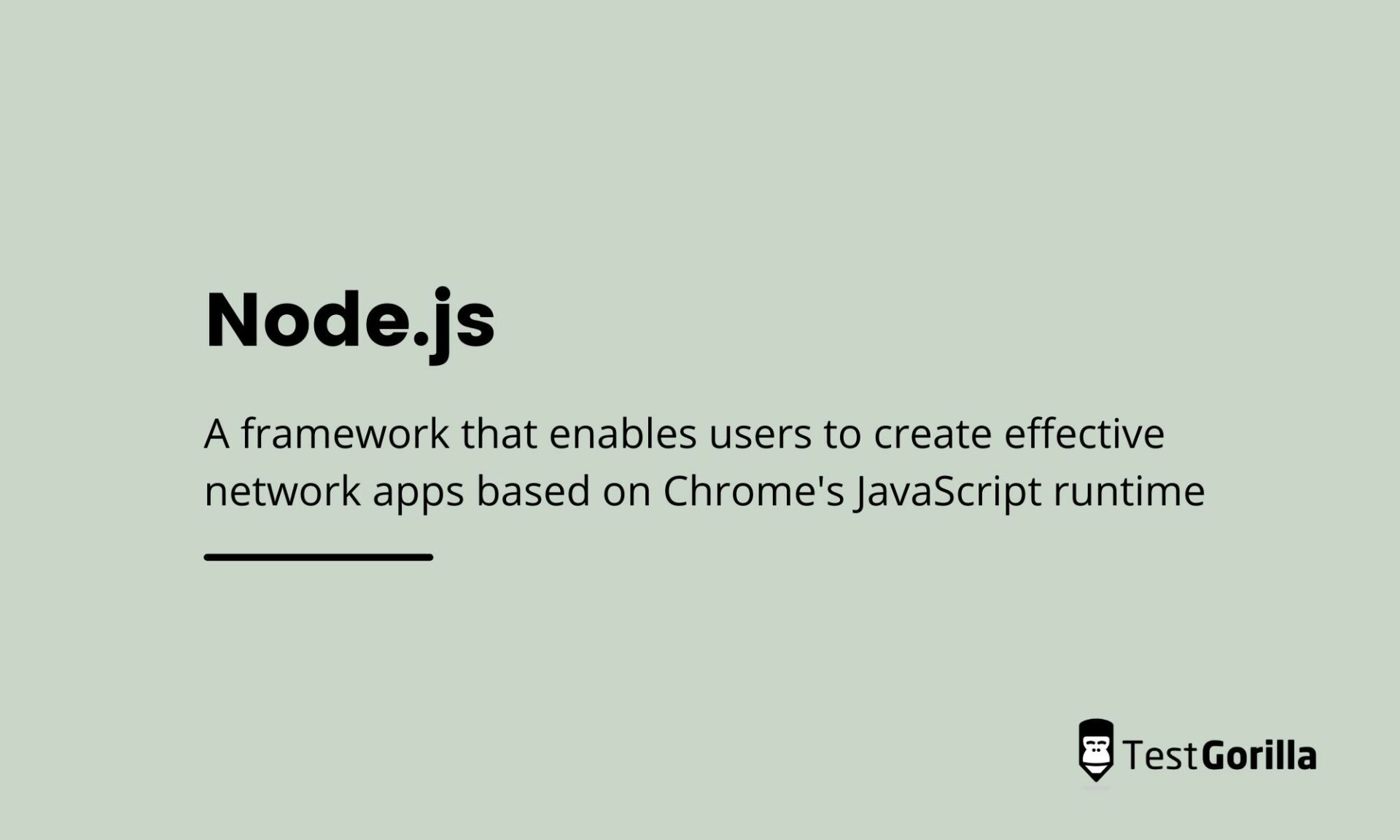The Node.js framework is now a permanent feature in software development and the tech industry, especially popular for its tools that can serve as a full-stack platform.
It also allows experts to develop a complete app code without switching between the front and back ends. Several tech firms need expert Node.js developers to handle the framework and keep up-to-date with industry trends.
In this article, we’ll explore the Node.js coding framework and discuss the soft and technical skills required of an expert Node.js developer. Finally, we’ll provide steps to hire a suitable candidate using TestGorilla’s Node.js test.
What is Node.js?
Node.js is a framework that enables users to create effective network apps based on Chrome’s JavaScript runtime. It’s easy to use due to its event-driven, non-blocking I/O approach, best for information-intensive and real-time apps operating on various devices.
As JavaScript is the building block for Node.js, many developers find the framework user-friendly with wide community support. It’s also popular because it offers some free and available code packages and modules.
Furthermore, Node.js contains simple Git tools that developers can use to handle more extensive projects. Using the framework requires an expert coder to write and reuse functional code to ensure excellent app performance and implement low latency.
Technical skills to look out for when hiring Node.js developers
Expert Node.js developers need certain key technical skills besides knowledge of Node.js. For instance, given the frequent data breaches at work, Node.js developers must understand security and data protection tools and data storage solutions.
Below are six crucial technical skills required of every top Node.js developer:
1. Excellent programming skills
To be a successful Node.js developer requires expert programming skills. They need skills in developing code for both simple and complex cases, and their code should be clear, functional, accurate, and affordable.
2. Knowledge of front-end and back-end technology
Node.js developers using front-end tech can work more efficiently with back-end tech. Many basic developers spend time making the back-end and front-end work, but a credible developer can work both to save time.
You can use other pre-employment tests to assess their skills in several front-end technologies and popular front-end frameworks such as Angular and React.
3. Working knowledge of RESTful APIs
RESTful APIs are essential for ensuring Node.js projects’ operational effectiveness. Make sure you determine how well candidates understand RESTful APIs before recruiting. Note that they should also be able to develop bespoke APIs where necessary.
4. Good knowledge of Node.js frameworks
The Node.js ecosystem, like standard web technology, comprises various frameworks that aid its development process. These frameworks also enhance existing Node.js capabilities. Node.js developers need to understand these frameworks to boost productivity.
This knowledge also enables developers to use the necessary coding tools to optimize Node.js projects. You should hire developers who can operate common frameworks like Hapi.js, Feather.js, and Sails.js, especially if your organization wants a scalable online app.
5. Asynchronous programming skills
Asynchronous programming is a similar format that allows several work units to run independently from the main app thread. Node.js developers must be able to code programs that are efficient in running more than one task simultaneously.
6. Databases proficiency
Expert Node.js developers need to construct database systems that sync with websites. They should also know when and how to choose an app’s database type.
The best insights on HR and recruitment, delivered to your inbox.
Biweekly updates. No spam. Unsubscribe any time.
Soft skills to look out for when hiring a Node.js developer
Besides technical skills, soft skills are necessary for top Node.js developers. Here are some soft skills to look out for:
1. Communication skills
Communication skills are critical in almost every profession. Node.js developers should communicate well, expressing themselves clearly in oral and written form.
Note that clear communication doesn’t require extensive use of complex language.
2. Problem-solving skills
Solving problems is a quality that enables developers to tackle common issues that arise in their roles. Node.js developers must have cognitive skills and a drive to identify and solve problems.
3. Willingness to learn and grow
The best Node.js developers have a strong and consistent desire to improve their skills. Your organization’s business development may stagnate if the team stops learning and expanding their skill set.
How to hire top Node.js developers
Having learnt the necessary skills required to be a top Node.js developer, you can understand why recruiting the best for your company is important.
Here are five steps to hire top Node.js developers for your organization:
1. Build a candidate profile
Finding expert Node.js developers for the job requires you to understand and determine the prerequisites of the position. You can build strong candidate profiles by determining your available positions, responsibilities, and expected impact on the job.
2. Draft a good job description
After determining the requirements of the position, you should reflect on the abilities and skill set needed for success. For instance, you can aim to hire a Node.js developer proficient in basic programming operations like HTML and JavaScript.
Besides essential technical skills for technical operations, you should consider candidates with exceptional non-technical skills, such as effective communication, team-building, critical-thinking, and problem-solving skills.
Additionally, you can draft a job description containing all the technical and non-technical skills your organization needs in a candidate. Here are some vital components of a good job description:
Job title, location, employment type, and remuneration
Company overview, vision, mission statement, and culture
An extensive list of responsibilities
Required technical skills for the job.
Benefits and incentives
You can learn more about the intricacies of preparing a good job description with our credible Node.js job description template.
3. Use pre-employment tests
The next step is to find candidates to screen and test. Examining your applicants in the pre-screening stage is a practical way to identify candidates who suit your organization’s needs.
Pre-employment assessments help you analyze candidates’ skills and engagement level, while also serving as a foundation to expand their skill set. They also help you recognize those who show innovative skills with tools they haven’t used before.
TestGorilla is ideal for this purpose. Our Node.js test evaluates candidates’ knowledge and skills in setting up Node.js and building APIs.
Additionally, it analyzes your applicants’ use of best practices and architectural vision related to Node.js development, enabling you to shortlist the best candidates with practical experience for the interview stage.
The test assesses the following abilities:
Setting up Node.js and related tools and packages for development and production
Implementing and recognizing various design patterns
Choosing the best architectural approach
Building Node.js APIs
Combining programming assessments with other cognitive ability tests is equally helpful.
4. Interview top candidates
After the pre-screening test, you will have a handful of the best candidates shortlisted from the test results. Invite these for a final interview to determine which candidate you want to extend an offer to. Below are some Node.js questions to help you in the interview:
Which command will install Node.js on Ubuntu Linux 18.04?
What are the main error types in Node.js?
How does Node.js relate to HTML?
How does Node.js relate to JavaScript?
What are the distinct features of Node.js?
What Node.js frameworks do you mostly use?
It’s also important to ask more generic questions that allow candidates to express themselves and reveal their persona. Sample interview questions available online will smoothen the process.
5. Make a good offer
After assessing candidates further in the interview, ensure you present good offers to the best performing candidate. It will help if your offer contains attractive bonuses and benefits proportional to the potential value of newly employed employees.
How to assess Node.js skills: interviews or pre-screening tests?
Some suggest that you should use either interviews or pre-employment tests, but that’s not what we advise. It’s important to use a pre-screening assessment alongside interviews to help secure the best developers for your company.
While interviews may help recruiters assess soft and technical skills and determine if the candidate has the persona and necessary drive for the organization needs, pre-employment assessments are instrumental in gauging candidates’ skill levels.
You should use the results from pre-employment tests to guide your interview process with each candidate. Ensure you register with TestGorilla today to access the best pre-employment tests for your hiring process.
You've scrolled this far
Why not try TestGorilla for free, and see what happens when you put skills first.





















